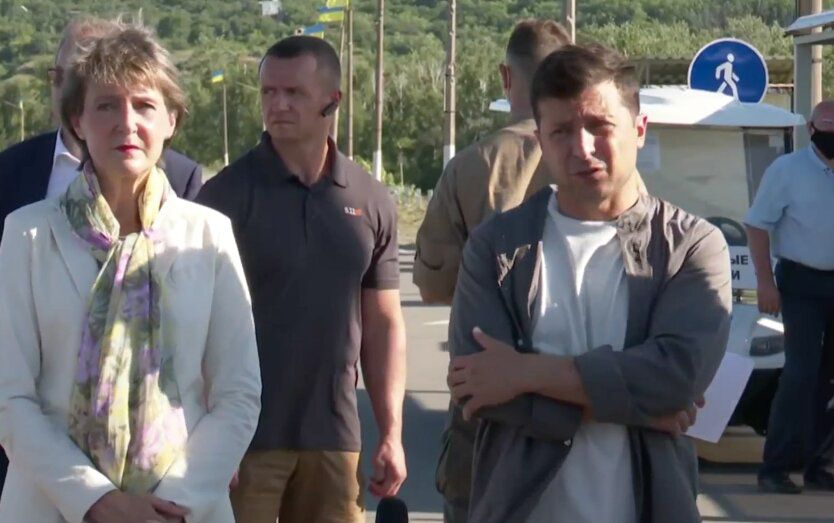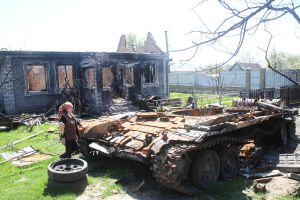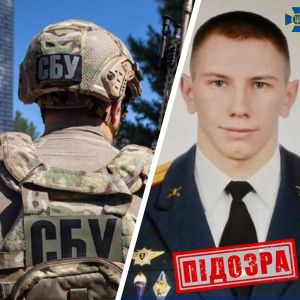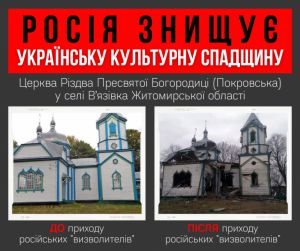In the photo: Presidents of Ukraine and Switzerland during a working trip to Donbas.
he Trilateral Contact Group (TCG) which is holding talks in Minsk has finally reached an agreement to this effect. At the Office of the President of Ukraine, this arrangement has been called a breakthrough in the Minsk peace process. At the same time it was stressed that the full and comprehensive ceasefire if observed by separatists will pave the road to the implementation of other provisions of the Minsk agreements. It was agreed to stop firing until the final settlement of the armed conflict in Donbas.
Under the agreement, all offensive operations, subversive acts and even reconnaissance must be stopped starting with Monday, July 27. A ban is put on shelling, using drones and snipers as well as on the deployment of heavy weapons in villages and towns and around them. Return fire is allowed to open to counter a military attack of the enemy or on orders of the high command and exclusively if an attempt to use a coordinating mechanism has failed.
A full ceasefire in Donbas has been declared several times over the past six years of the war. The first Minsk agreement or Minsk-1 was signed immediately after the bloody Battle of Illovaisk (also known as the Illovaisk Cauldron) that had turned into a massacre of Ukrainian military organized by pro-Russian troops in 2014. Minsk-1 ended major combat with a ceasefire but sporadic clashes still regularly kill civilians, Ukrainian soldiers and separatists.
The year 2015 began with the heavy fighting over Donetsk International Airport near the town of Debaltsevo. The many-hour night negotiations of the leaders of Ukraine, Russia, Germany and France ended with Minsk-2. The second Minsk agreement called for a complete ceasefire from February 15. But three days later Russian forces together with separatists captured Debaltsevo. With heavy fighting Ukrainian troops managed to break out of the encirclement.
A year ago, on July 21, one more comprehensive ceasefire was declared. It is still in force, nominally. However, in the east of Ukraine Ukrainian soldiers are killed as a result of shelling by pro-Russian separatists. That is why many Ukrainian politicians and analysts do not believe that in Moscow they really want peace to be restored in Donbas. As says Denys Kazansky, a member of the political subgroup at the TCG, “I can see that all agreements that have been reached with Russians and their satellites have been later either abolished or ignored by Russians themselves”.
Apparently, President Volodymyr Zelenskyy, considering the grievous experience of Ukraine, declared on July 23 that the agreement on a full and comprehensive ceasefire should be signed by all leaders of the Normandy Format countries Russia, Germany, France and Ukraine. He believes that this measure will enhance the status of the ceasefire agreement and make its implementation more feasible.
“This document is going to be signed by all sides of the Normandy Group. I think that Ukraine, France, Germany and the Russian Federation will sign it. And beginning with July 27, I believe, the ceasefire will become stable”, said President Zelenskyy.
At the same time, he has stressed that the reached agreement will not deprive Ukrainian military of the right to self-defense.
So far, it is still unknown how Paris, Berlin and Moscow will respond to the proposal of the Ukrainian President.
Meanwhile, Brussels has evaluated highly Zelenskyy’s efforts to promote the implementation of the Minsk agreements. The leaders of the European Union expect that Russia will support the striving of Ukraine and use all its influence on separatists in order to establish the lasting peace in Donbas. Such was the statement of Josep Borell, High Representative of the Union for Foreign Affairs and Security Policy, who added that sanctions of the European Union against the Russian Federation would remain in force until the Minsk agreements will be implemented in full.
For his part, United Nations Secretary-General António Guterres called on the sides of the conflict in Donbas not only to honor the agreement on introducing the full ceasefire from July 27 but also to take further measures in order to ensure a new impetus in the peace-seeking efforts of the Normandy Four.
The newspaper Holos Ukrainy






